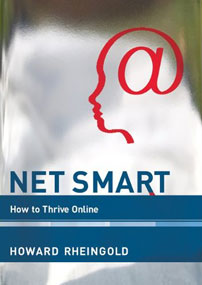"You have to make [decisions] in the context of what you intend to get done for the day. Write down, with good old right-brain pencil and paper, three things you want to get done [online] today, and just two or three words each, and put that in the periphery of your vision," he said. "And when your gaze falls upon it, simply ask yourself 'Is what I'm doing now going to get me to where I need to be by the end of the day?' I'm not asking you to admonish yourself or to make any changes to your routine, I'm only asking you to add a little layer of awareness."
This exercise in self-control can be honed over time with tools like meditation, Rheingold writes in a chapter called "Attention!"
"Mindfuless in all its forms and applications certainly is an end in itself, but practicing mindfulness in regard to online attention serves a specific strategic goal," he writes. "Your goal and mine in this context is not just the control but also the management of attention."
Rheingold is not alone in his ideas about how meditation can help focus attention when online. Researcher David Levy recently provided evidence on how learning how to meditate can train the mind to focus. (Read How Meditating Helps With Multitasking). In his study, Levy said those who learned how to meditate were able to keep on task better than those who didn't. “They realized they didn’t have to respond to everything right away, not everything is urgent,” Levy said. “They felt more in control, less tense, less afraid.”
 GUIDING KIDS ONLINE BEHAVIOR
GUIDING KIDS ONLINE BEHAVIOR
As the digital landscape continues to shift under our feet, it's that much more important for parents to be aware of the subtleties of having an online identity and life. Though the media portrays the Web as a "den of frivolity," Rheingold writes that it also presents an appropriate place for young people to experiment with their identity. "What they are learning is not altogether detrimental to themselves and the society they are going to build when they come of age," he writes.
At the same time, kids needs to be aware that their online lives will leave indefinite footprints.
"Kids need to be told before they get online that nowadays everything that you put online is going to be there forever, it's going to be searchable, it can be connected to your name, it can be reproduced, and it can be spread around the world," he said. "Kids have always done dumb things and they've always kind of said snarky things about each other and they've always had their best friends. They've never had them reproduced forever, search-ibly and reproduce-ibly and able to be broadcast everywhere. You need to know some of these things before you dip your toe in."
And though the media is rife with stories of online bullying -- with good reason, as it is a common phenomenon -- the development of audio and video chats like Skype and FaceTime on Apple devices may help to ameliorate online attacks.
"There's something about face to face that can't be duplicated online. But a great deal of that signaling can be duplicated with audio and video," Rheingold said. "So I think we're getting a richer form of communication than we used to have. Here's a research question for some sociologist: Are people going to flame each other when we have universal audio and video or is that an artifact of the text-only world?"
- Additional reporting by Amanda Stupi



